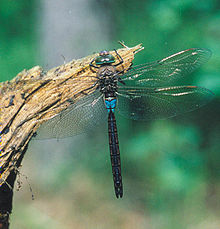Anax (dragonfly)
Appearance
| Anax | |
|---|---|

| |
| Anax parthenope | |
| Scientific classification | |
| Domain: | Eukaryota |
| Kingdom: | Animalia |
| Phylum: | Arthropoda |
| Class: | Insecta |
| Order: | Odonata |
| Infraorder: | Anisoptera |
| Family: | Aeshnidae |
| Genus: | Anax Leach, 1815[1] |
| Type species | |
| Anax imperator Leach, 1815
| |

male A. tumorifer
Anax (from Ancient Greek ἄναξ anax, "lord, master, king")[2] is a genus of dragonflies in the family Aeshnidae. It includes species such as the emperor dragonfly, Anax imperator.[3]
Anax spp. are very large dragonflies. They generally have light-colored bodies and dark tails with pale markings.[4]
Some species are migratory, for example Anax junius.
Species
[edit]The genus Anax includes these species:[5]
- Anax amazili (Burmeister, 1839) – Amazon darner[6]
- Anax aurantiacus Makbun, Wongkamhaeng & Keetapithchayakul, 2022
- Anax bangweuluensis Kimmins, 1955 – swamp emperor[7]
- Anax chloromelas Ris, 1911 – dark emperor[8]
- Anax concolor Brauer, 1865 – blue-spotted comet darner[6]
- Anax congoliath Fraser, 1953
- Anax ephippiger (Burmeister, 1839) – vagrant emperor[9]
- Anax fumosus Hagen, 1867
- Anax georgius Selys, 1872 – Kimberley emperor[10]
- Anax gladiator Dijkstra & Kipping, 2015 – swordbearer emperor[11]
- Anax gibbosulus Rambur, 1842 – green emperor[10]
- Anax guttatus (Burmeister, 1839) – lesser green emperor[10]
- Anax immaculifrons Rambur, 1842 – magnificent emperor[12]
- Anax imperator Leach, 1815 – emperor dragonfly,[13] blue emperor[14]
- Anax indicus Lieftinck, 1942 – elephant emperor[15]
- Anax junius (Drury, 1773) – common green darner[6]
- Anax longipes Hagen, 1861 – comet darner[6]
- Anax maclachlani Förster, 1898
- Anax mandrakae Gauthier, 1988
- Anax nigrofasciatus Oguma, 1915 – blue-spotted emperor[16]
- Anax panybeus Hagen, 1867
- Anax papuensis Burmeister, 1839[17] – Australian emperor
- Anax parthenope (Selys, 1839) – lesser emperor[13]
- Anax piraticus Kennedy, 1934
- Anax pugnax Lieftinck, 1942
- Anax selysi Förster, 1900
- Anax speratus Hagen, 1867 – orange emperor[18]
- Anax strenuus Hagen, 1867 – giant Hawaiian darner, pinao[19]
- Anax tristis Hagen, 1867 – black emperor, magnificent emperor[20]
- Anax tumorifer McLachlan, 1885
- Anax walsinghami McLachlan, 1882 – giant darner[6]
Taxonomic history
[edit]The genus Anax was described by William Elford Leach in 1815 when he published the first bibliography of entomology[citation needed] in Brewster's Edinburgh Encyclopedia.[1]
References
[edit]- ^ a b Leach, W.E. (1815). "Entomology". In Brewster, David (ed.). Edinburgh Encyclopaedia. Vol. 9. Edinburgh: William Blackwood. pp. 57–172 [137] (in 1830 edition). doi:10.5962/bhl.title.30911 – via Biodiversity Heritage Library.
- ^ ἄναξ. Liddell, Henry George; Scott, Robert; A Greek–English Lexicon at the Perseus Project.
- ^ "Genus Anax Leach, 1815". Australian Faunal Directory. Department of the Environment, Water, Heritage and the Arts. 9 October 2008. Retrieved 18 April 2010.
- ^ Watson, J.A.L.; Theischinger, G.; Abbey, H.M. (1991). The Australian Dragonflies: A Guide to the Identification, Distributions and Habitats of Australian Odonata. Melbourne: CSIRO. ISBN 0643051368.
- ^ Paulson, D.; Schorr, M.; Abbott, J.; Bota-Sierra, C.; Deliry, C.; Dijkstra, K.-D.; Lozano, F. (2024). "World Odonata List". OdonataCentral, University of Alabama.
- ^ a b c d e "North American Odonata". University of Puget Sound. 2009. Archived from the original on 11 July 2010. Retrieved 5 August 2010.
- ^ Kipping, J.; Clausnitzer, V. (2018). "Anax bangweuluensis". IUCN Red List of Threatened Species. 2018: e.T60295A72307075. doi:10.2305/IUCN.UK.2018-1.RLTS.T60295A72307075.en. Retrieved 12 November 2021.
- ^ Clausnitzer, V.; Dijkstra, K.-D.B.; Suhling, F. (2016). "Anax chloromelas". IUCN Red List of Threatened Species. 2016: e.T59810A72308494. doi:10.2305/IUCN.UK.2016-3.RLTS.T59810A72308494.en. Retrieved 12 November 2021.
- ^ Subramanian, K.A. (2016). "Anax ephippiger". IUCN Red List of Threatened Species. 2016: e.T59811A72310087. doi:10.2305/IUCN.UK.2016-3.RLTS.T59811A72310087.en. Retrieved 12 November 2021.
- ^ a b c Theischinger, Gunther (2006). The Complete Field Guide to Dragonflies of Australia. CSIRO Publishing. ISBN 0-643-09073-8.
- ^ "Anax gladiator Dijkstra & Kipping". PLAZI. Archived from the original on 3 January 2019. Retrieved 29 July 2016.
- ^ "Checklist, English common names". DragonflyPix.com. Archived from the original on 4 December 2012. Retrieved 5 August 2010.
- ^ a b "Checklist of UK Species". British Dragonfly Society. Retrieved 5 August 2010.
- ^ Mitra, A. (2016). "Anax imperator". IUCN Red List of Threatened Species. 2016: e.T59812A72311295. doi:10.2305/IUCN.UK.2016-3.RLTS.T59812A72311295.en. Retrieved 12 November 2021.
- ^ Anax indicus, Dragonflies and Damselflies of Thailand
- ^ "Anax nigrofasciatus". The ASEAN Centre for Biodiversity. Archived from the original on 25 July 2011. Retrieved 25 August 2010.
- ^ ABRS (18 July 2012). "Species Anax papuensis (Burmeister, 1839)". Australian Faunal Directory. Australian Biological Resources Study. Retrieved 23 January 2017.
- ^ Boudot, J.-P.; Dijkstra, K.-D.B.; Clausnitzer, V.; Suhling, F.; Schneider, W.; Samraoui, B. (2016). "Anax speratus". IUCN Red List of Threatened Species. 2016: e.T90669049A72313202. doi:10.2305/IUCN.UK.2016-3.RLTS.T90669049A72313202.en. Retrieved 12 November 2021.
- ^ "Anax strenuus". Hawaii Biological Survey. Retrieved 25 August 2010.
- ^ Clausnitzer, V.; Suhling, F.; Dijkstra, K.-D.B. (2016). "Anax tristis". IUCN Red List of Threatened Species. 2016: e.T59814A72314386. doi:10.2305/IUCN.UK.2016-3.RLTS.T59814A72314386.en. Retrieved 12 November 2021.
Wikimedia Commons has media related to Anax.
Wikispecies has information related to Anax.
